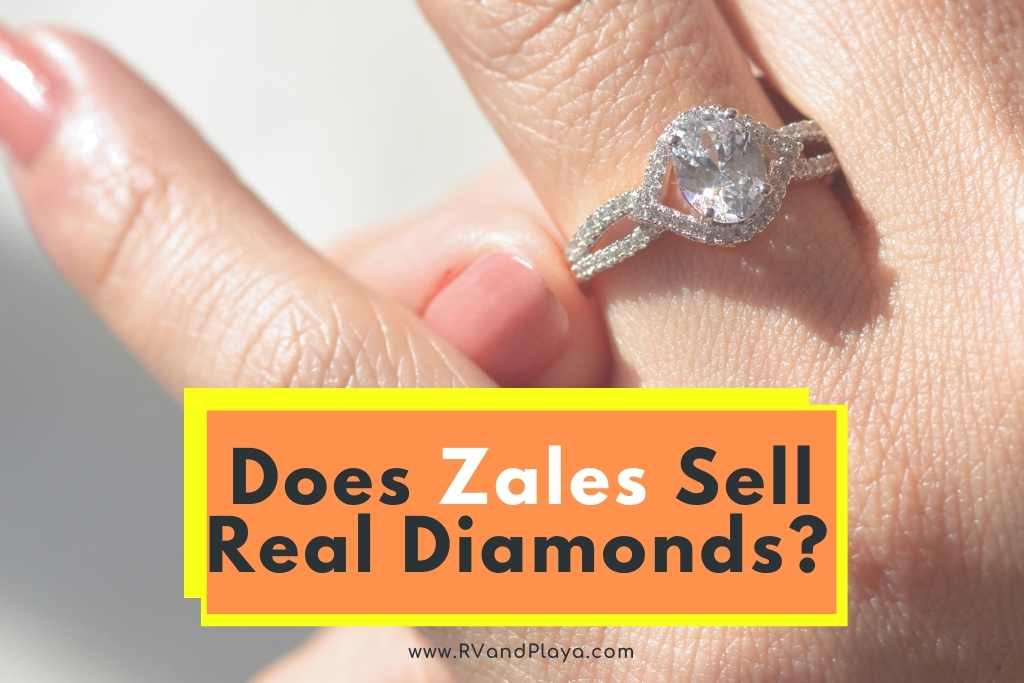If you’re looking for an engagement ring, or jewelry for a special occasion, you might take a look at what Zales, also known as ‘The Diamond Store’, has to offer.
If so, you’ll face a question many diamond customers encounter – are the diamonds real?
Zales offers both natural and lab-created diamonds for their jewelry, with the promise that all their diamonds in both categories are G.I.A certified and 100 percent real.
Read on, as we take a closer look at the details that determine the authenticity and quality of Zales Diamonds.
Table of Contents
Does Zales Sell Real Diamonds?
On their official site, Zales offers options for both naturally created diamonds and lab created diamonds.
Furthermore, Zales offers a guarantee that all their diamonds of both categories are certified for quality by an independent lab, according to the standards of the G.I.A (Gemological Institute of America).
Are Lab Created Diamonds Real Diamonds?
According to gemologists, lab created diamonds are every bit as real as their naturally formed counterparts.
The composition of lab created diamonds is identical to natural diamonds – 100 percent pressurized carbon.
They are also subject to the same grading and certifications as naturally created counterparts.
What Are The Differences Between Lab Created and Natural Diamonds?
There are only 3 distinct differences between the two types of diamonds:
– Origin: Earth versus Laboratory
– Age: Millions of Years versus Months
– Availability: Very Rare versus Potentially Unlimited
These factors don’t change the basic nature of the diamonds created in the lab, but it does change some of the factors that influence the price of the stones.
This is why lab created diamonds are considered more affordable if you’re worried about your budget when shopping.
Read also >> Are Zales Diamonds Certified? (Review, Quality + More)
What Are Some Concerns That Have Been Raised About Zales Diamonds?
Zales declares their diamonds as certified, 100 percent authentic diamonds. Experts in the diamond trade agree that lab-created diamonds are still genuine diamonds, so why would there be questions about authenticity or quality?
Here are some considerations raised by Diamond Experts:
– No Loose Diamonds Offered:
Many other jewelers with customized designs, or customizable designs, offer a range of loose diamonds of varying quality, grading, and size. This is something Zales doesn’t offer, at least on their website.
– Listing Gives Carat Weight, Color, and Clarity but NOT Cut:
Zales listings will tell you the Carat Weight, the Graded Color, and a Clarity grade, but won’t tell you how the quality of the cut measures up in terms of grading.
This leaves their diamonds open to the question of whether or not you’re getting the optimal cut to make your diamond shine.
– Certification is Uncertain:
Zales offers a guarantee that all their diamonds are certified and come with a Certificate of Authenticity. However, they don’t offer the grading certificate for review.
Zales also offers a caveat on their online shop stating that merchandise may not always be exactly as shown, which leaves a lot of room for questions.
In addition, experts say that Zales offers an IGI certification, which uses the same categories as GIA grading, but isn’t considered as trustworthy in the diamond community, and sometimes gives diamonds a higher grade than they deserve.
Since the certified grade of a diamond impacts the price, the less reputable certification sometimes causes experts to question the quality and authenticity of the merchandise.
How Can I Be Sure I Have a Real Diamond?
If you’re feeling uncertain about the authenticity or the quality of the diamonds you purchase from Zales, or any other store, there are several ways to verify that you’ve got what you paid for.
The most surefire method is to have the stones in question appraised by an expert or graded by a third-party lab.
Third Party Appraisal or Grading:
The downside to third party grading or appraisal is that it generally costs a fee. You also have to do your research to make sure your appraiser is trustworthy.
If you decide to take this route, you may want to consider sending your stones to the GIA (Gemological Institute of America) or the AGS (American Gem Society). They can not only guarantee the authenticity of the diamond but the quality of the stone.
GIA or AGS can give you a certificate of authenticity, as well as a detailed report of its condition and quality.
Depending on how detailed a certificate you request, you can potentially have every inclusion and flaw documented, along with the basic 4 Cs of Color, Clarity, Carat Weight, and Cut.
Other Methods of Checking Authenticity:
There are several unofficial tests you can do to verify the authenticity of your diamond.
Water Test:
Fill a glass about three-fourths full of water and drop the stone in. A genuine diamond will sink, a fake diamond is more likely to float or bob.
This isn’t a good test for diamonds in a setting as part of jewelry unless you’re willing to risk damaging the stone and the setting.
Fog Test:
Breathe on the stone to get a fog. If it fades quickly the stone is real, and if it takes several seconds, then the stone is fake.
This is probably the easiest and most well-known method to check a diamond’s authenticity.
Check Settings and Mount:
Real diamonds are usually placed in high quality jewelry, with high quality metal such as gold, or platinum.
The settings or the main part of the jewelry can tell you what kind of metal forms the main body of the jewelry.
They can also tell you if the diamond is fake. Fake diamonds will sometimes have a C.Z. for Cubic Zirconium etched into the band. So if you see a C.Z., you definitely have a fake diamond.
Heat Test:
If you heat a diamond to high heat, it won’t respond. Diamonds are formed under intense heat and pressure, so adding a little more heat won’t have any effect.
Glass or Cubic Zirconium, on the other hand, will warp, crack or break.
UV Light Test:
Put the stone under a UV light. Most diamonds give off a blue glow.
This isn’t considered the most reliable test, because some diamonds don’t glow, even if they are genuine.
The Dot Test:
This is a test best used on loose stones, but the method is fairly simple.
Draw a dot on a piece of paper and set the diamond flat side down over it. Then look through the pointed end.
If the diamond is real, the light will refract in such a way that you can’t see the dot, or even a reflection of it. If not, you’ll see the dot or a reflected image.
This can also be done with a newspaper.
Sparkle Test:
To conduct a sparkle test, hold the stone up to white light, or firelight. A true diamond will refract with a high sparkle that throws out both colored and white lights.
Cubic Zirconium, but contrast, will throw off less light and less varied refractions.
Professional Methods:
There are several other methods used by professionals that you can try if you’re interested in learning more about the tools of the trade.
Inspection using a loupe, a high profile scale, microscope and electrical conductivity can all be used to determine the authenticity of a diamond.
James Allen is the leader in online diamond sales. Their imaging technology is the same as inspecting a diamond with a jeweler's loupe. They have the largest exclusive loose diamond inventory online and fantastic prices.
They also have the nicest collection of lab created diamonds online. Save 10% off select lab grown diamonds and 25% off ring settings during limited time sale!
WHAT WE LOVE ABOUT THEM:
- No questions asked returns within 30 days of shipment. James Allen will send you a paid shipping label to return the ring.
- Lifetime Warranty
- Free International Shipping
- Free prong tightening, repolishing, rhodium plating and cleaning every 6 months
- Provide insurance appraisals
- One free resizing within 60 days of purchase
- Free ring inscriptions
- Best-in-class high quality imagery of all diamonds in stock
- 24/7 Customer Service
- Best-in-class packaging
Final Thoughts
Zales offers a wide variety of lab created and natural diamonds in several cuts. Each diamond is backed by a quality guarantee and the assurance that it has been certified.
Lab created or natural, there’s a good chance that the diamonds you purchase from Zales are 100 percent genuine diamonds.
If you’re really concerned about the quality or the authenticity of the diamonds, however, there are several ways you can verify for yourself that everything is genuine and exactly what you paid for.
Odds are, you’ll find out everything is good, but there’s nothing wrong with checking when you’re making such a big investment.
References
https://www.zales.com/lab-created-diamonds
https://www.zales.com/education/diamonds/diamond-4cs
Recent Posts
Do you know if Zales sells real gold? Well, you are at the perfect place to find the answer to such a question. Buying jewelry can be stressful because it is so expensive and special. But it's...
Diamonds and other gemstones come in a lot of different qualities. It's not always easy to know what the quality of your gemstone is. That's where certifications come in. Zales diamonds are...


